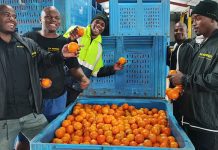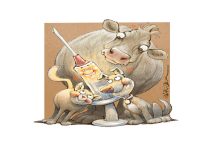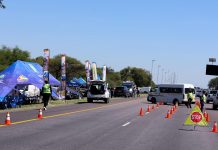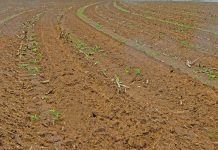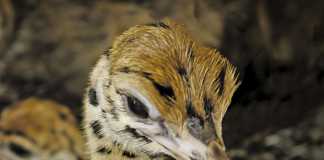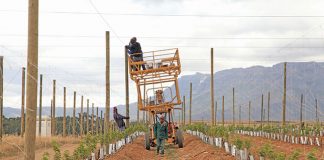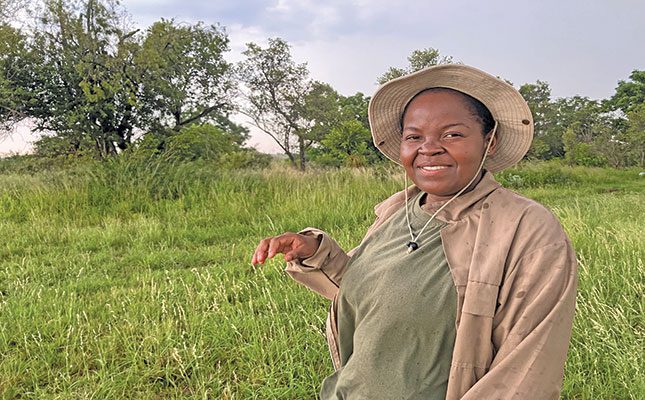
Photo: Tanya Faber
Dinokeng Game Reserve, 40 minutes from Pretoria, opened its doors in 2011 as a model of future conservation where people and wildlife live in harmony in a sustainable way.
Now, a 122ha smart farm that sits right near the reserve and close to the community of Hammanskraal is taking root and producing crops while uplifting the local community, with the help of WWF South Africa.
The farm fits in with the United Nations approach of One Health – an integrated, unifying approach to balance and optimise the health of people, animals and the environment. The farm was purchased by Inqaba Biotec, a DNA and genome sequencing company, for its corporate social investment work.
The organisation’s executive director, Dr Oliver Preisig, had often visited Dinokeng and admired the piece of land on its doorstep as the perfect spot for innovation that would also enhance the tourism offering of the reserve.
Because of their interest in promoting agroecology as a farming method that considers both people and nature, WWF and Inqaba are now working together on this ‘smart farm’ project.
The ‘smart’ component of the farm is that it reduces waste, works with the rhythms of nature, optimises the use of fuel, water and organic fertiliser, while boosting the livelihoods of those involved in a way that goes beyond mere wages.
“Through our Business Development Unit, in 2022 Inqaba teamed up with us,” explains Luyanda Njanjala, Smallholder Farmer Programme Manager at WWF, “and in January 2023 we started drawing up our plan to test an agroecology model close to a metropole area.”
At that time there was not much on the farm apart from a centre-pivot irrigation system that covered 22ha, but Preisig and Njanjala spotted the potential for growth.
For Preisig, the position of the farm made it the perfect location for Inqaba’s corporate social investment project:
“It’s next to the highway, so it’s visible. It’s near the game reserve, so there is already a flow of tourists to the area, and the Hammanskraal community is within walking distance.”
The farm already had a centre pivot, so Njanjala said it made sense to buy additional ones, along with tractors and tools, “to enable the farm to sustain itself and grow high-value crops to make sure that there is money generated by the farm”.
Thus began the recruitment process to identify community members who could be upskilled and helped to improve their lives, as they hail from a peri-urban area beset by the usual problems of unemployment, poor sanitation and lack of access to clean water.
Njanjala and the newly appointed farm manager, Zanele Motau, searched for residents of Hammanskraal who already had an interest in farming and had their own backyard gardens.
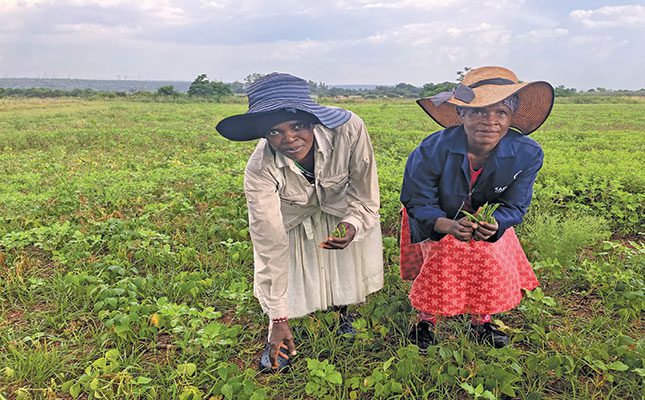
Inqaba said there were already people working at Dinokeng Game Reserve who had been given pockets of land for farming on and it would make sense to train them too and knit them into the ecosystem. From the two groups, 40 people were interviewed and 24 were selected.
Njanjala worked on the business concept and says the idea was to transition to an agroecological approach in a responsible manner.
What exactly is agroecology?
According to renowned international non-profit the Soil Association, agroecology is about balancing the relationships between plants, animals, people and the environment in a sustainable way. This is done in three ways:
- Mitigate climate change by reducing emissions, recycling resources and prioritising local supply chains.
- Work with wildlife by managing the impact of farming on wildlife and harnessing nature to do the hard work, such as pollinating crops and controlling pests.
- Put local farmers and communities in the driving seat by giving them power, and adapt agricultural techniques to suit the area and its specific social, environmental and economic conditions.
As Njanjala points out, working on virgin land would make it easier to go the organic route, but this farmland “has a 30-year history of chemicals being applied to kill weeds and grow food faster”, and so organic methods need to be introduced slowly.
On the point of ‘putting farmers and communities in the driving seat’, WWF held a five-day agroecology training session in November last year. This included going out into the field with a trainer and learning about permaculture, and planting climate-smart and water-wise indigenous crops.
The smart farm has already supplied McCain with green beans after Njanjala negotiated a contract, while the farmers also took full boxes to market at the local fresh food fair where they were sold for R60 a box.
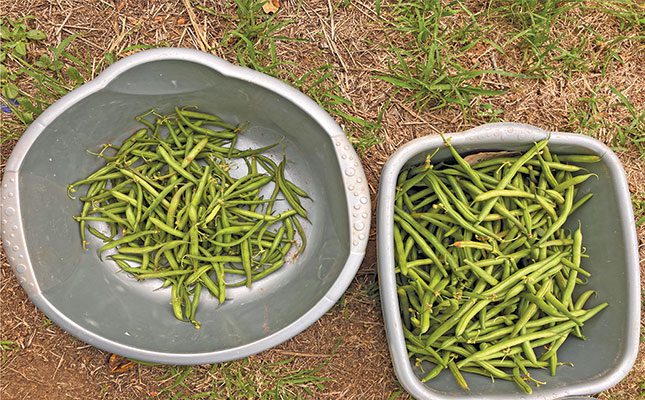
This speaks to improved market access for those on the ground, while Njanjala also secured a contract from the culinary industry for groundnuts that have been planted over 2ha.
The smart farm is also taking youth empowerment and employment seriously. Of the 24 trained, 16 are young people who receive a stipend of R4 500 per month as they learn and work on the farm. Soon, all will also get their own ‘tunnel’ for further planting with an adapted irrigation system for this purpose.
“It is very hot in Hammanskraal and if you plant in an open field, you find that after irrigating, just a few minutes later it dries out. The tunnels help solve this problem,” says Njanjala.
Farm supervisor and tractor operator Godfrey Hatang says of the tunnels: “You can plant any time of the year with this technique because you can regulate the temperature. With climate change, planting outside can be difficult as it might rain far more than it used to or be hotter. In the tunnels, the plants can still germinate even if conditions change.”
He adds that fewer pests come into the tunnels, and it saves money and the environment if farmers don’t use insecticides.
Dimakatso Makause (28) is one of the people who was trained and shares her new-found understanding of some agroecological concepts.
“I learnt so much. I learned about soaking seeds before you plant them, and which plants to plant in what season. We also now know which plants deter insects.”
Makause is now applying her knowledge to the pocket of land allocated to her at Dinokeng Game Reserve. She said that before the training, they had been given seeds but no training, so there was a real gap.
Another component is linking to academic institutions so that tertiary education skills are put into practice. The smart farm has teamed up with the Tshwane University of Technology, allowing students studying agriculture to complete their experiential learning component out in the field.
The students stay for a period of 40 weeks, and staff from the farm mentor them as they write up their reports.
The longer-term plan for the smart farm includes free-range chickens, fruit trees, showcasing permaculture to the public, a nursery, and a farmhouse with a few small animals that will attract tourists.
Preisig says: “We also want to open it one day for joggers and mountain bikers because they can’t do that in the actual reserve. We are also imagining a quarry and a little dam for fishing. It’s an experimental farm that could be a showcase for kids and adults alike to enjoy.”
If it’s a success, it could become a blueprint for other smart farms of the same nature. Already the farm is making inroads with livelihoods. Farm manager Motau reflects on the feedback from community members who were selected.
“We can see the change. Firstly, there is a better understanding of taking care of the environment, but secondly, people feel uplifted. One said he had been able to deposit money for the material needed for his house. Another said he was now able to get his driver’s licence. One was in a state of depression but said that working on the farm had helped create a sense of purpose and achievement.”
She adds that supplying McCain is a benefit because “it motivated [us] to compete with the big guys. It puts us on a level with the commercial farms and that pressure worked in our favour.”
For Hammanskraal community members Pascal Manevana and Gontse Kekana, the smart farm has been a game-changer.
“I didn’t just learn about planting. I also got some business skills and I feel 100% that this is going to help us with livelihoods as we can earn something from this place. I look forward to seeing livestock here one day,” says Manevana.
Kekana says she learnt about types of soils, which veggies like which type of soil, and “how to think like a businessperson”.
“This training has impacted my life. I never knew what crops to plant in what season, or which plants were water wise and could survive without irrigation. We did practical work on planting groundnuts and pumpkins and discovering how they survive with little to no irrigation. I also learnt about mulching. These are examples of skills and knowledge I can take with me.”



